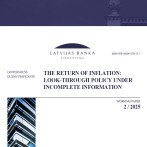In March, consumer prices undergo a seasonal rise; annual inflation drops
In March, the annual inflation dropped to 0.3%. At the same time, several factors affecting the average annual inflation changed, among them, the postponement of the liberalization of the energy market to 2015. The impact of seasonal factors in March meant a rise in the monthly inflation (the wearing apparel and footwear of the new season appeared in shops), but it did not reach the 2013 level (e.g., the dynamic of vegetable prices was even the opposite of the one in the previous year), which brought down the annual inflation slightly.
Even though the price of oil dropped slightly month-on-month (that was not reflected in the average price of fuel, however) and the liberalization of the energy market was postponed, the main inflation risks are related to the uncertainty of the dynamic of energy (as well as global food) prices. These have both a political character and are related to the new harvest under the impact of weather conditions. Here it mainly concerns the prices of grain, sugar, and vegetable oils, which also rose in March.
The changes in administered prices, which have been approved or submitted to the Public Utilities Commission (PUC), could have a mutually cancelling effect on the average inflation of 2014. For instance, the thermal energy tariff was reduced in Daugavpils in March, but in May, the prices of water supply and sewage services will rise. In March, the PUC also approved the reduction in inter-operator settlement tariffs for telecommunication services as of July. The decision regarding the tariff plan submitted by AS "Rīgas ūdens" is yet to be made (a rise in prices is expected).
The period of price monitoring that included weekly data has concluded and does not indicate adjusting pricing policies to the "attractive" or "rounded" prices. Several businesses that had chosen to change their price-lists according to costs along with the beginning of dual pricing or as of the euro introduction (in areas where cash settlements are common/usual), did so during that time (both reducing and raising prices). Yet there are many cases where the prices have been calculated accurately and their "rounded" or psychologically attractive form during the changeover period was not retained in euro.
The consumer survey by the European Commission indicates that inflation expectations are diminishing in Latvia. Even though the postponement of the electrical power market liberalization only postpones instead of precluding a rise in power prices, the wide discussion of this fact in March was possibly the main reason why the percentage of the respondents who believe that the price level will rapidly go up in the nearest 12 months dropped whereas the percentage of those who think that the prices will rise slowly or remain unchanged rose. The actual low inflation may also play a role in this assessment.
Textual error
«… …»






